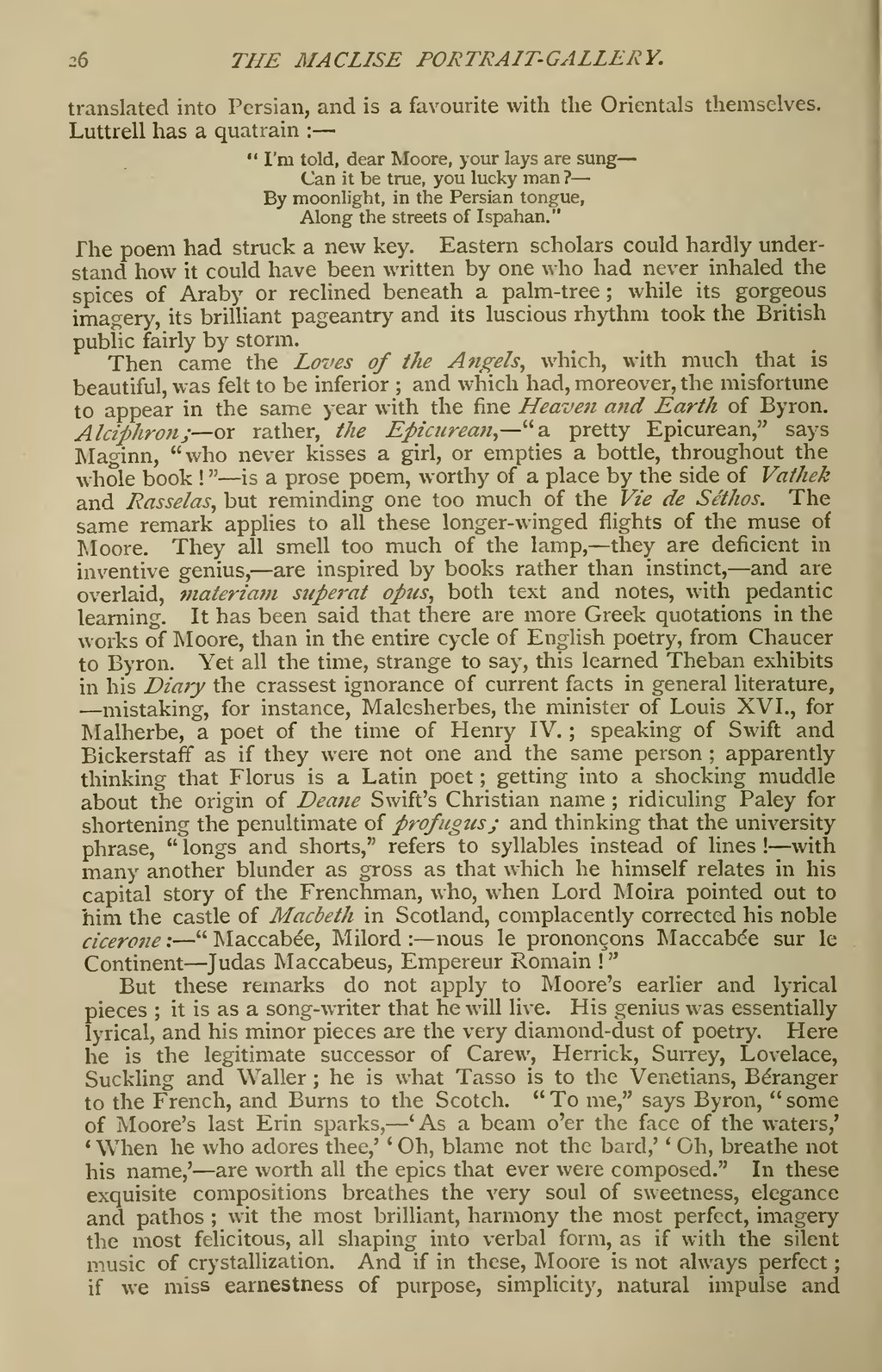translated into Persian, and is a favourite with the Orientals themselves. Luttrell has a quatrain: —
"I'm told, dear Moore, your lays are sung—
Can it be true, you lucky man?—
By moonlight, in the Persian tongue,
Along the streets of Ispahan."
The poem had struck a new key. Eastern scholars could hardly understand how it could have been written by one who had never inhaled the spices of Araby or reclined beneath a palm-tree; while its gorgeous imagery, its brilliant pageantry and its luscious rhythm took the British public fairly by storm.
Then came the Loves of the Angels, which, with much that is beautiful, was felt to be inferior; and which had, moreover, the misfortune to appear in the same year with the fine Heaven and Earth of Byron. Alciphron;—or rather, the Epicurean,—"pretty Epicurean," says Maginn, "who never kisses a girl, or empties a bottle, throughout the whole book!"—is a prose poem, worthy of a place by the side of Vathek and Rasselas, but reminding one too much of the Vie de Sethos. The same remark applies to all these longer-winged flights of the muse of Moore. They all smell too much of the lamp,—they are deficient in inventive genius,—are inspired by books rather than instinct,—and are overlaid, materiam superat opus, both text and notes, with pedantic learning. It has been said that there are more Greek quotations in the works of Moore, than in the entire cycle of English poetry, from Chaucer to Byron. Yet all the time, strange to say, this learned Theban exhibits in his Diary the crassest ignorance of current facts in general literature,—mistaking, for instance, Malesherbes, the minister of Louis XVI., for Malherbe, a poet of the time of Henry IV.; speaking of Swift and Bickerstaff as if they were not one and the same person; apparently thinking that Florus is a Latin poet; getting into a shocking muddle about the origin of Deane Swift's Christian name; ridiculing Paley for shortening the penultimate of profugus; and thinking that the university phrase, "longs and shorts," refers to syllables instead of lines!—with many another blunder as gross as that which he himself relates in his capital story of the Frenchman, who, when Lord Moira pointed out to him the castle of Macbeth in Scotland, complacently corrected his noble cicerone: —"Maccabée, Milord:— nous le prononcons Maccabée sur le Continent—Judas Maccabeus, Empereur Romain!"
But these remarks do not apply to Moore's earlier and lyrical pieces; it is as a song-writer that he will live. His genius was essentially lyrical, and his minor pieces are the very diamond-dust of poetry. Here he is the legitimate successor of Carew, Herrick, Surrey, Lovelace, Suckling and Waller; he is what Tasso is to the Venetians, Béranger to the French, and Burns to the Scotch. "To me," says Byron, "some of Moore's last Erin sparks,—'As a beam o'er the face of the waters,' 'When he who adores thee,' ' Oh, blame not the bard,' ' Oh, breathe not his name,'—are worth all the epics that ever were composed." In these exquisite compositions breathes the very soul of sweetness, elegance and pathos; wit the most brilliant, harmony the most perfect, imagery the most felicitous, all shaping into verbal form, as if with the silent music of crystallization. And if in these, Moore is not always perfect; if we miss earnestness of purpose, simplicity, natural impulse and
